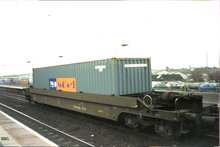Tiphook
Tiphook PLC was a United Kingdom headquartered transport services company that was registered on both the London and New York stock markets.
It focused on the leasing of containers and trailers to serve this expanding sector and quickly proved to be quite lucrative, and thus the company entered into the provision of other services, such as maintenance, as well as growing internationally.
Throughout the 1980s, Tiphook frequently acquired various other companies, issuing shares and taking on debts in order to rapidly expand, yet the value of some of these acquisitions were subsequently called into question.
While the company continued to be profitable into the early 1990s, it had built up a substantial debt burden that was leveraged upon its assets, the value of which dropped considerably as more containers became available on the market.
In the early 1990s, Tiphook's financial situation sharply declined as its assets depreciated sharply and questions over its accounting practices were raised by creditors; its expansion into the North American market had US accounting practices applicable, under which the condition of the company led to a technical, and then actual, default in its debt coverage.
As a result, the company underwent drastic restructuring, Montague and many senior figures were pushed out, and Tiphook was broken up to pay off its debts during the mid-1990s.
This transition resulted in customers and transport companies requiring more flexible business solutions, resulting in Tiphook having two basic service offerings, these being the supply of leased ISO containers, and of leased trailers (both road and railway) The company supplemented this initial model with value-added services including maintenance and trans-border clearance.
[6] As a consequence of its expansive strategy, Tiphook accumulated relatively high levels of debt, which were assured to lenders through assets on the business' balance sheet.
[8][9] The company had intentionally structured its growth to avoid becoming overly dependent upon any single country or customer, an approach which supposedly also limited its exposure to recessionary pressure.
[19] In June 1994, Tiphook appointed former BOC finance director Ian Clubb as its new chairman with the primary priority of stabilising the business.
